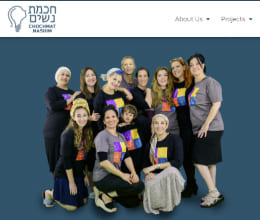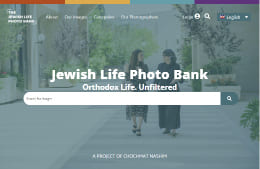Originally published in In Jerusalem, April 28, 2017
Planning a meaningful, enjoyable and affordable event to celebrate a bar/bat mitzva, wedding or anniversary can be daunting. Doing so from across the world can be exponentially harder. Yet, every year, that is exactly what thousands of Jews from around the world do in order to celebrate their smahot in Israel.
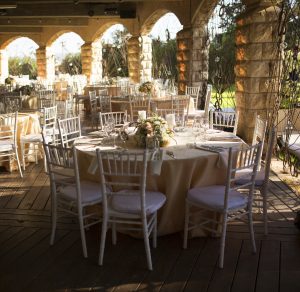
Celebrating in Israel connects the celebrants with their nation, land and history. It also provides an opportunity to add meaningful elements to the occasion that go beyond a party, by partaking in one of the many hessed (charitable kindness) opportunities available specifically for people marking their occasions here.
The Distenfelds of Bergenfield, New Jersey, have held both of their daughters’ bat-mitzva celebrations in Israel and plan to do the same for their other children when they come of age. Why hold the event here when almost all of their friends and family live in the US? “We feel that reaching Jewish adulthood should be celebrated in a way that is truly meaningful and makes a lasting impression on the child and the entire family,” mom Aviva Distenfeld says.
“It’s also the right time to encourage them to think about what it means to be a part of something bigger, both communally and nationally, to inspire a love of our land and a relationship with it during their formative years so it shapes who they become.
“When we go for the bat mitzva trips, we incorporate hessed opportunities like Leket (picking produce to give to the needy) and do a lot of ‘biblical’ touring, connecting them to their Torah learning in a very real way. We also have a party. There isn’t anything wrong with a party, but we try to make it a part of the celebration as opposed to the focus.”
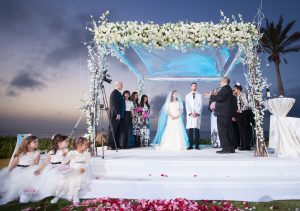
Distenfeld offers advice for people who are looking to celebrate in Israel.
“Enlist the help of locals. Whether that’s an actual party planner or just a friend, it can be difficult to navigate details from here [abroad].”
In Israel, the venue you choose for your simha is often laden with meaning. Whether a hall overlooking the Old City of Jerusalem, a kibbutz in the middle of the desert, or in a hall at a children’s home, your choice of where to hold your event adds to the feeling you seek to invoke. But, beware – there are still practical things to think of.
Adena Mark of A to Z Events, who has planned events for hundreds of families from abroad and Israel, cautions those wanting to plan their events here. “Don’t go online and Google places and assume that what you see is what you get. Details change from location to location. Ask questions, such as, ‘Where is the venue located? Is it accessible? Does it have the desired kashrut? Can music be played late?’” Further, she says that the way packages are put together in Israel is very different from in the US. “In the US, caterers bring a lot of the items. Here that’s not necessarily the case. Some venues offer a lot in one package, in others, very little is included. You may end up needing various vendors to get all the elements that you want for your event.”
Her initial advice for those seeking to have their simha here is to start planning early to ensure that guests can come, or if there are specific dates needed.“A year in advance is not too early to start planning to make sure you have the event you’re dreaming of.
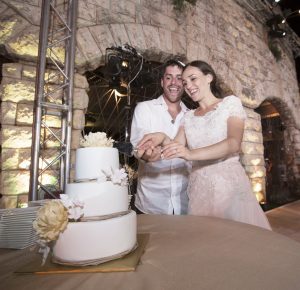
It’s also important to have some idea in mind of the type of location/party you want; be it intimate, themed, family-oriented, sophisticated, etc. Consider whether the people nearest and dearest to you will be able to attend,consider the differences in style and culture, and consider the cost of travel and accommodations as well.”
Whether to use an event planner depends on your needs and availability to do the legwork. There are a few things to take into account when deciding. A planner will know how to get you the most for your money and which places include what in their packages. This includes the photographer, DJ/musician, the venue, caterer, etc. She can save you weeks of work and research and help you avoid pitfalls. Often, planners have relationships with venues and vendors, and can get you discounts and extras you couldn’t get on your own. Planners also save you money on unexpected “add ons” – last-minute additions you may not be aware of. But most importantly, a good planner ensures that you are a guest at your own affair –arguably a priceless gift.
From photo booths to magnet guys, drum circles to T-shirt designers, extras can be a fun way to make an event stand out and give your guests something to take home and remember the occasion. It’s definitely worth bringing some things from abroad, but often a lot of great party extras – hats, balls, lights and more – can be ordered here as well. Best to ask before you shlep. Many people like to add an element of hessed to their smahot.
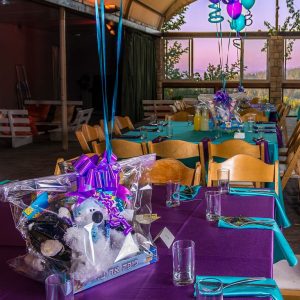
For my own daughter’s bat mitzva, we celebrated her health, as well as her coming of age. Being with her in the hospital when she was very ill as an infant gave us an appreciation for the medical professionals and the children for whom the hospital was home. We therefore invited guests to contribute toys and games to be delivered the children’s ward in Shaare Zedek Medical Center. The gift packages were the table centerpieces at the party.
Today, many nonprofits and organizations offer packages for families who celebrate events here. Lone soldiers or special needs individuals can be invited as guests. A bar or bat mitzva can be shared with an orphan. Families can pack food for needy families, visit the sick, care for the environment, or choose from many more options to add a giving and communal element to the celebration.

Mark says she asks celebrants what is meaningful to them when asked to suggest a “hessed.” “Who is the person? What do they like? Sports? Great, we can donate sports equipment to the Koby Mandell Foundation and have a sport day for them. One couple’s grandfather had been saved by a Hatzalah defibrillator, so they chose to donate a defibrillator in gratitude. They learned about Hatzalah’s work and had a dedication ceremony.”
Celebrating an event in Israel is an opportunity to instill values, share happiness, express gratitude and connect with our shared land and people – past, present and future. It creates a bond that lasts far beyond the event itself.
While the focus is on content and not on façade, this no longer means compromising on quality, assures Mark.
“The level of sophistication, formality and elegance can be equal or greater to what you see abroad. Food, design and service have increased in quality to accommodate the expectations of olim and visitors from abroad.”
Whether you choose high-end sophistication or authentic Israeli informality, celebrating your special day in Israel is an experience you won’t regret.

